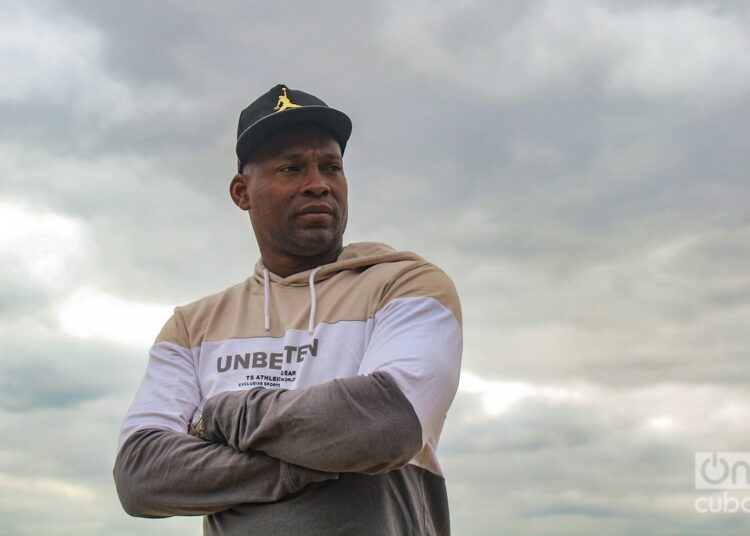When Teddy Tamgho jumped 17.90 in the final of the World Indoor Championships in Doha 2010, Yoandri Betanzos tried to get back into a competition that he thought he had won. He was astonished, he thought he was the champion and the three jumps of the young Frenchman turned his plans upside down. With 17.69 he would have reigned in many previous events. In most of them, to be honest. He knew that it was his last chance to try to shake off that curse of finishing second or third.
He jumped again, overwhelmed and half bewildered by the indoor world record of a lanky Frenchman trained by a Cuban named Iván Pedroso. Betanzos stood at his mark, took a few controlled breaths and got ready to run. One, two, three jumps. Once in the air, he entrusted himself to those divine powers that always denied him the highest place on the podium. However, it was not the exception. Fate condemned him, once again, to be a silver medalist at a world event.
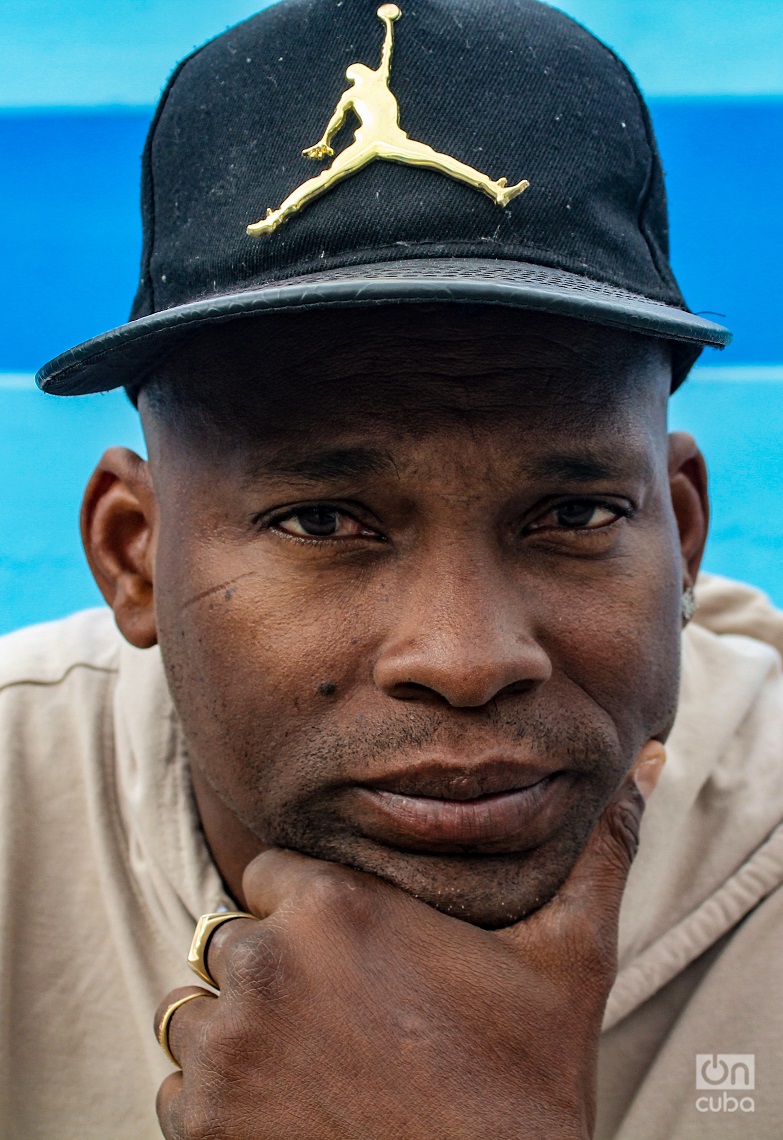
Almost 15 years later, a cold January morning makes him remember that and other times. He still has that thorn in his side from Doha, and from the 2004 Athens Olympic Games. But he also has the pride of being the triple jumper from the island with the most world medals wearing the Cuban national team jersey, despite so many limits that surround the history of Cuban athletics.
Betanzos does not forget the times they tried to eliminate him, nor the forced retirement, nor the lack of respect after he was no longer on the national team. But he continues forward. Today he is a coach in India and aspires to become one of the best in the world. He still has a competitive craving and wants with all his might that Olympic medal that eluded him as an athlete.
Born on the track
He was born in Santiago de Cuba, almost on the track, because his mother never stopped practicing athletics during her pregnancy. “She trained for nine months; she didn’t tell anyone. One day at the hurdles she had a pain, they took her to the hospital and there she gave birth. The belly was not noticeable, she was wearing a girdle and, according to her, the doctor said that I had gotten inside a rib and that was why she did not miscarry,” he says, a little surprised.
Although as a child he wanted to be a boxer like his father, the path to the king of sports was paved by chance. At the age of four he moved to Ciego de Ávila and at seven he tried his luck in the ring, while alternating with the activities of country life: hills, animals, sugarcane, river…
Why, if you liked boxing more, did you choose athletics?
That’s life. My older brother was in athletics. One weekend there was a competition, one of the competitors was missing and he asked me if I wanted to go. I said yes and it turns out that I won the provincial without knowing anything. I was asking how the competition was in each event. I had never trained. That’s when they recruited me.
My plan was to change to boxing, because my father was a coach at the EIDE sports school, but when I tried they told me that I had to leave athletics and then come back for boxing. So I said: “Nope! I’m staying right here.”
***
From that time, he remembers a lot about the support of his father, who learned from the indiscipline of the past and tried to make his son always go down the right path. He also doesn’t forget the stages of the EIDE and ESPA sports schools, spaces where he had to grow and assimilate life in a totally different context than the one he was used to.
“There I learned a lot. Above all, to be independent. I started in fourth grade and there were classrooms for up to twelve graders. You know, the age difference was terrible. At first I even cried when I had to be at school the whole week. You had to survive, because the older ones were always on top of the little ones. Above all, I learned to be organized and independent. Today I wash, I know how to cook, I know how to do everything, it was thanks to that.
“At that time, the EIDE in Ciego Ávila didn’t have many training conditions. I was training on a soccer field and my coach at the time, Osmani García, opened a space between the dormitories, we covered it with some sand and sawdust and we jumped there. We had to walk a long way to get to a track with all those implements, carry the high jump mat, the hurdles…more or less two kilometers carrying all that stuff; carry it and bring it back….”
I read that in the lower categories you broke a Sotomayor record…
Yes, when I was 13 years old. I was good at the high jump; in fact, it was the event that I liked.
What did you feel when they finally changed you to the triple jump?
Tremendous pain, I cried and everything. In the end I understood that it wasn’t where I should be, and that was even though I was better than Víctor Moya at that time, what happened was that coach Luis Alberto Pinillo told my teacher that there wasn’t much of a future for me because of my height. Then Ricardo Ponce, from triple jump, told Osmani how to train me in the triple jump and promised to take me to the national team. That’s what we did. In 1998 I won gold at the nationals.
***
From then on, he would be linked to that discipline until the day he retired. First came the 16 meters, motivated by a conversation he overheard between his father and Ricardo Ponce, who was conservative about Betanzos’ chances of beating athletes who had already been training for a year. The mere doubt offended him and he broke his barriers to defeat them all. Then, in a youth competition he surpassed 16.80 and later he found himself training alongside legends such as Yoelbi Quesada, Yoel García or Aliecer Urrutia.
“In the national team the competition was tough. There were quite a few jumpers and, as we had different coaches, there was a lot of rivalry. Later, new kids came in who were very good. There was a time when Yoelbi took fifth place in a competition, with 17.38. It was tough.
“In my early days, everyone gave me advice, but the one I looked up to the most was Yoelbi. He helped me a lot, even competing. I think I already knew that he was finishing and I was just breaking through. In Athens 2004, he was with me; he helped me. In terms of technique, we were quite similar. I also looked up to Urrutia and Yoel García a lot. Almost all of them had something good. Iván Pedroso also helped me a lot.”
What does Ponce mean to you?
Everything. I have had two coaches in my life. One since I started as a kid and he taught me everything from the competitive attitude to how to make a girl fall in love with me. That is Osmani García; he was very important at that stage, and Ponce in what came after; we have always been together, I continued working with him even before I left for India. It’s like he was my father.
From Santo Domingo to Doha: years of medals and something more
Just when David Giralt was opening the way for himself, Betanzos was suspended for a year due to an indiscipline that he prefers not to reveal. Upon his return, with discomfort in his Achilles tendon, the challenge was to win the gold medal at the Santo Domingo 2003 Pan American Games.
“Despite the injury, life smiled on me at the Pan American Games first and then at the World Championships in Paris, where I did not make a great mark, but I got silver, with 17.28. I had quite a few problems, because the Achilles tendon was the one for the jump. I had to take off, fall and then take off again,” he recalls and affirms that he was an athlete who was never affected by pre-competition predictions.
“I was always going to compete to win. The prediction never interested me, because it is based on things that happened or could happen: you can have 17.90; but tomorrow you have to repeat it with me there, if you succeed, there are no problems.”
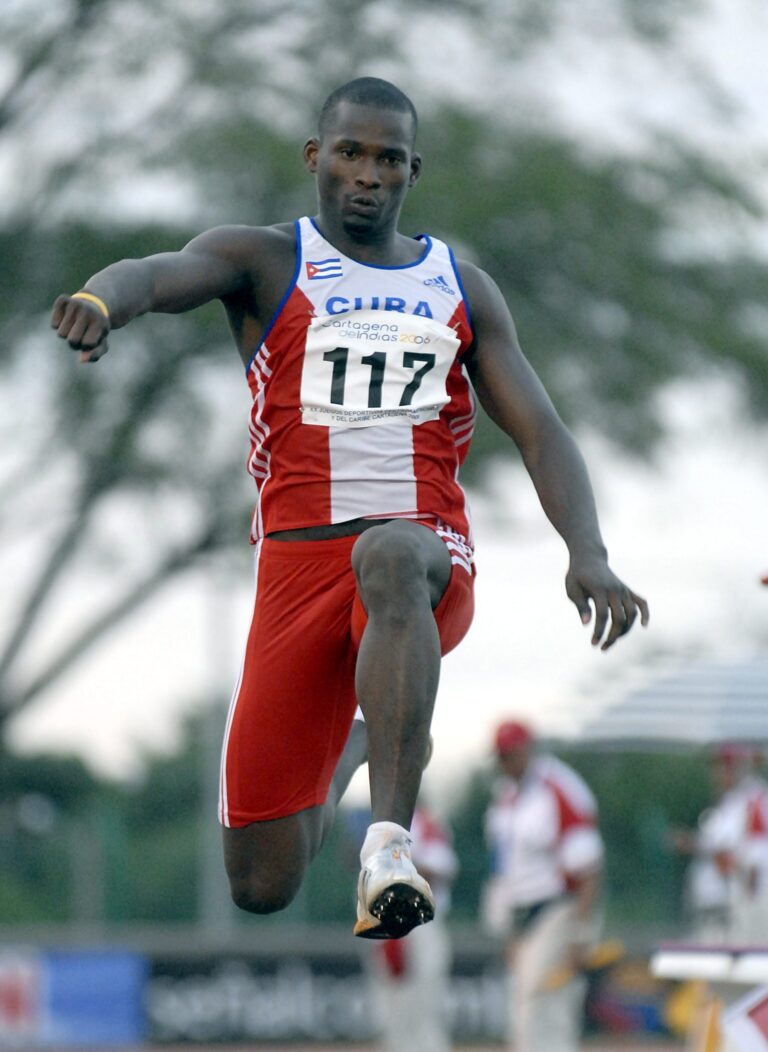
***
What he remembers most about his first world medal in Paris is how motivated he was. And the fact is that human beings are often moved more by necessity than by dreams. Life is not one of those stories that always ends well. It’s a drama, one of those films that when the credits roll, brings tears to the eyes of even the most robust being.
“Before, when you started new and went on tour you earned ten dollars a day, so if you had a Pan American result you earned 20 or 25. When I won my gold in Santo Domingo I said: ‘Wow! I already have 20.’ That was what motivated me, because there was a lack of everything and it was necessary to help the family. When I went to the World Championships and won the silver, I thought: ‘I already have 30,’” he smiles, “because one works for something, and although you want to see it in another way, there are very few who practice sport just for love.”
***
After winning those two important medals, he lived through one of the most disappointing moments of his career, marked by a precedent that is swept under the carpets of the National Athletics Commission. In Athens 2004 he finished in fourth place, one centimeter away from the bronze. It was, without knowing it, the closest he would get to an Olympic medal.
“That was quite hard for me. Athens also has a different story. I hadn’t lost anything to anyone in Cuba, not a long jump without momentum, not a quintuple jump, not a speed jump with any of the triple jumpers. I had a competition with Yoel, who for me is an animal: the guy had surgery on his tibia, he came back weighing about ninety-something kilos, very fat, he jumped fifteen meters in the Cuba Cup and out of respect they took him for the tour. He went down to 80 kilos and jumped 17.05; I never thought he would do that. In that competition I put my foot down wrong way and my ankle got a little sore.
“At that time, my colleague Sigfredo Bandera, a friend of the technical head, was the trainer of Yoel and Yoelbi, while Ponce had David and me, but the trainer who would take two of the three who would attend was going to the Olympic Games. They realized that I was hurt. That was on a Monday, and they eliminated me on Friday. It was crazy, because I had to recover and the president of the Nationals Institute of Sports, Humberto Rodríguez, had advised that they should leave me alone, but they suggested that if I didn’t compete and the others jumped more than me, I would stay. I had to do it. I jumped 17.18 and they took me out on a stretcher, I knew that I could only do one jump and not foul.”
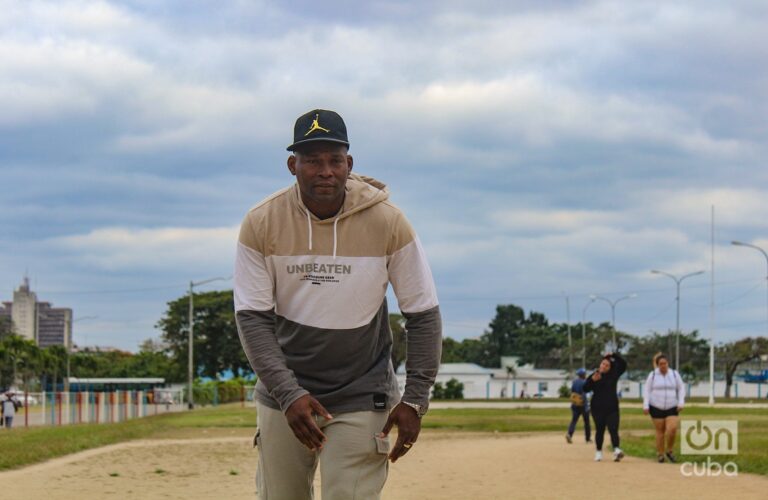
***
After that passage, the recovery advanced a bit, although in the qualifying round in Athens he suffered again after marking 17.53 in the first attempt: “I was doing very well, strong for the Olympic Games. Already for the final, doctor Álvarez Cambras said: “He can make a jump, he’ll jump the second if he has his feet on the ground and the third take him out, he won’t jump anymore.”
“In the first jump I fouled and inside me I thought that I had to score no matter what in the second. I really jumped to score and I got 17.47. It wasn’t an attempt where I went all out; I had to make sure, because I was already in a lot of pain. I got a swollen ankle and in the last jump the Russian took the bronze from me by a centimeter. I went for the last opportunity; but I stayed at 17.24, I couldn’t get my foot in. I was doing very well in that competition, but life…,” he says and remains in suspense for a few seconds that revive the thorn of Athens and an Olympic medal that he could have achieved.
After that, you got the bronze indoors in Budapest 2004, the silver outdoors in Helsinki 2005, the bronze indoors in Moscow 2006. In which of these events did you see yourself closest to gold?
In Budapest I had no options, there was Olsson with more than 17.80 and I really didn’t get there. I saw myself with more possibilities in Helsinki and in Moscow, where they cheated on me a little. The Russians cheat a bit. The American came in on the first jump, a huge one, and they gave him 17.30, he complained, and when they measured again: 17.74, they had taken away 44 centimeters.
I came and did a record jump; more than eighteen meters! I saw that I went over the mark and they gave me a foul, but those who were directing us were not into the competition. The order was that there was no claim. “Let him jump again!” they said. For me it was not a foul, it was well stuck, but the clay was never marked. They took the flag, put it on the board and they took a good mark from me.
There is a lot of talk and criticism about you for not winning a gold or an Olympic medal, but there is hardly any talk about the gold medals in the world finals in Monaco 2005 and Stuttgart 2006, where you beat the best jumpers in the world.
I won the World Final twice. It is not highlighted as much, because that does not matter here in Cuba. The eight best jumpers were there, but almost none of my results are taken into account. There is not much talk about that.
***
In 2007, after the Central American gold in Cartagena 2006, Betanzos won the bronze in the Pan American Games in Rio, but a back injury kept him away from the activity completely. It could have worsened, to the point of leaving him disabled. In addition to the physical effects, he also felt mentally affected.
“The psychological part is very important. I didn’t think so before. I was a strong-minded person, but there are things that only psychologists can solve. That affected me. It’s psychological, before it hurt, but I jumped. When they did the MRI and told me I had a grade 2 herniated disc, I couldn’t think straight. I couldn’t reach 16 meters and I could become disabled.”
After that situation, how can one jump again?
I couldn’t think straight. I was thinking of retiring and in 2009 I said: “I’m going to start from scratch, to get the idea that I have no results, that I’m nobody.” I did everything consciously. I didn’t do the technical part just for the sake of it, because there comes a time when, as you know things, you do everything automatically. I incorporated new things; I didn’t do strengthening and I added it in the afternoons. It worked and I improved my mark.
What happened in Berlin 2009?
I went with the idea of getting a world record. It was where I was at my best, and yet I didn’t make it to the final. I was a bit stupid too, because I was in a fight with the commissioner and I needed to prove things, since they even wanted me to retire. That year I started to improve my records. In the qualification I made two backward fouls, and in the last one I took off a meter from the board. I was doing very well at that time, but I was left behind; that’s the way the cookie crumbles.
In several interviews you have spoken of cheating and moves that were made at the national team level. What kind of things were they?
There are athletes who are very popular, I don’t know if it’s because of their character, and others who aren’t, but they have to accept them because they are good. I was one of those who weren’t very popular. They always tried to overshadow me and even now, if you look closely, they hardly talk about me, but of the Cuban triple jumpers I am the one with the most world medals, even though I don’t have a gold medal.
They have always wanted to minimize my results. There was a year that I had a very hard time. It was the time when Esteban Brises was the team manager. One way or another they always made me jump and win, otherwise I would stay. In the preparation for the 2010 World Indoor Championships, David Giralt, Alexis Copello and I were in the process of elimination, because only two could go. We were being eliminated, so to speak, because I was not competing, while everyone was training outside.
I even said to Bandera: “Now tell me, what kind of elimination is this? Send me to Cuba, if they are competing in the end.” There was an event and they told me that I had not been invited. I said: “Did they not invite me or did they not propose me? What is it?” Then Javier Sotomayor, who has always gotten along very well with me and at that time was the manager, told me: “Look, there is a competition right here in Spain, participate, because it is the last one, you have no more opportunities.”
Two days before, Sotomayor told me that I was going to England. It was a good competition, the best were there, and, although I didn’t want to go, I remember that I came second behind Christian Olsson. Afterwards I was in a call center calling home and next to me Sotomayor was talking to Brises. I feel that Sotomayor said to him: “Hey, Brises, what do you want me to do?! He was the one who won!”
Do you think it was something personal?
I don’t think it was something directly against me, but against my coach, but it was reflected in me. Afterwards it was a bit more personal because I also positioned myself in favor of my coach.
Something similar happened in the 2008 pre-Olympics: the last competition, there were three of us qualified for Beijing and after the last jump they held a competition at the Marrero stadium; Copello had not reached 17 meters all year, the other one had not either and there they were, at about 17.50. My chance for the Games was given to Copello and Tosca’s was given to Héctor Dairon.
They told me: “They are leaving for the Olympics, you jump here, if you do it better than them, we will bring them back.” I thought: “Stop messing with me, brother, where’s the money for that.” I don’t underestimate the quality of my colleagues; but they had not done it all year and on the last occasion they managed it. It makes you think. Maybe it was true, maybe not, however, time had already run out, and I stayed.
Why do you think that, despite so many similar stories coming to light, these types of situations still persist?
Here in Cuba the national championship doesn’t define anything. In all countries, even if you are the champion, if you don’t win or you’re among the top two or those who qualify to go to the competition, you don’t go. I understand that we don’t have enough population to do that, but at that time triple jump had six or seven athletes on par. The national championship had to define something.
That’s why people said that the triple jumpers jumped well here and didn’t do the same in the main competition. Of course! If you spend the whole year eliminating yourself here, when you get to the event you’ve already given away your best jumps.
At the World Indoor Championships in Doha in 2010, something similar to what happened in Athens happens to you…
I didn’t expect it. I could jump higher. I recorded 17.69. In most of the World Indoor Championships, that would have been gold, and I kind of relaxed a bit. But the competition is not won until it is over. I was satisfied. I was doing very well at that time, look at how after, frozen, when Teddy Tamgho jumped 17.90, I had a good jump, but I was cold. They surprised me with a world record. I didn’t imagine that he, at his age, was going to do that.
After that result, the commissioner didn’t even congratulate me, so you can see how the story went. We met at a barbershop and he made a joke: “Hey! Congratulate the man who is in a good mood,” and I said: “No, I’m not in a good mood now, this is the fifth world medal I’ve won.” He didn’t even know.
Where do you place yourself in the history of Cuban triple jump?
I think that ahead of me, in terms of results, are only Yoelbi Quesada and Yoel García. I don’t think there is anyone else. Of course, I’m talking about those who did the whole race in Cuba. Yoel is a world indoor champion and Olympic silver medalist; Yoelbi has Olympic bronze and is also a world champion. Those two have to be ahead of me, but I am the one who has the most world medals competing only for Cuba.
What if we include those who are out?
I am among the top five. Pichardo must be included, because for me he is among the two or three best in the world of all time. Jordan is just starting out now, but he is already an Olympic champion, he has the third best time of all time. He already, when he trained with me and Ponce at 16, jumped 17.30. That is crazy. He did not jump more because they treated him badly and did not give him the importance they should have given him. They treated him like just one more. They said he was a coward, but he was just a child, he had not matured. Now it is different, because he already believes it.
From retirement to India
After the World Championships in Doha, Betanzos had the satisfaction of winning his third Pan American medal, the silver in Guadalajara 2011, and he attended his second Olympic Games in London, although not in the way he would have wished. His retirement was lurking in the form of rumors, fueled by decisions that went beyond his own wishes.
“I didn’t take it well. I was on holiday and they didn’t tell me directly. ‘Betanzos is going to be retired’ was the comment that was made. I felt fine. I didn’t want to retire. How are you going to retire me? Did I tell you I wanted to retire? At least, considering the results I had, give me the opportunity to try and let me be the one to decide. It wasn’t feasible for the next Olympic cycle, that is, I was no longer useful to them. They used me and discarded me. I see that as very bad.
“I found out through rumors and then they announced it, because the list of those who had been cut out reached my province. They call it retirement out of respect for the results one has had, but that was a cut from the national team. I have not been given any retirement,” he said.
Later, Betanzos continued training on his own, an effort he could not maintain, as he had to face the challenges of a life outside of active sport. “The motivation was not the same. I was on the street; I had to produce and I could not be in sports all day. I took my car and worked as a taxi driver at night, like everyone else, because things didn’t add up.”
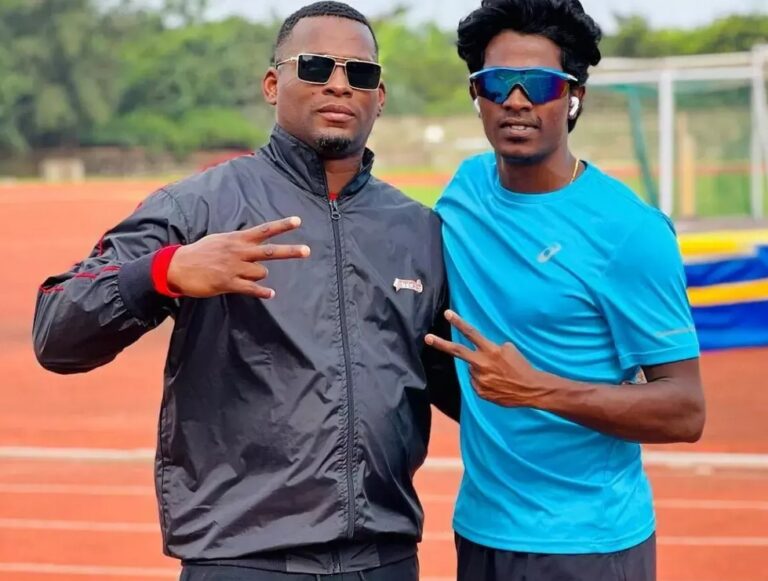
How did the possibility of training in India come about?
I started working with Ponce, learning. Then the pandemic came, everything stopped, and I was in a store, organizing the queues. That was really difficult. Shortly before all that was over, Yandro Quintana, the wrestler, who was in India, called me. He told me that they were looking for a jumping coach: “Do you speak English?” he asked me. “Yes, I speak English, I speak everything,” I answered. A lie! I didn’t speak any, but I had to make an effort. Everything happened quickly. I went through a trial period, came back, stayed in my shop and after about 15 days they sent me the ticket and presented me with the contract.
What goals do you have as a coach now?
The Olympic medal that I don’t have. My athletes already have good marks; although they still lack the psychological part of believing it. We have to keep working. Physically and technically they are doing very well.
Would you have liked to compete for another country?
Well, considering the economy and other things, yes, of course.
It is said that during your active days you got offers…
When you are a good athlete and you have results, people come up to you and talk to you a lot. But I am a very family-oriented person and at that time I couldn’t stand being away. I mean, I was far from my family, but I could see them whenever I wanted. At that time, you had to defect and there weren’t the possibilities for contracts that there are now. So that didn’t work for me, and even now I don’t see it as a possibility. I’m quite Cuban, brother. I like it here.
What did you feel when you saw an Olympic final where the three medalists were Cuban, but they represented another flag?
Tremendous pride, because really all three were made here and, besides, Jordan is training with a Cuban too, so he is from the Cuban school as well. Andy left here with a good record, and Pichardo also left being Pichardo, it’s not that they were made there or anything. So, it’s a pride and they showed it: the Cuban school of triple jump is the best in the world.
What aspects should Cuba improve in terms of procedures and conditions for talents?
Conditions are needed. Athletes like Andy, Jordan and Pichardo have another motivation from the economic point of view; they have peace of mind, they don’t feel suffocated. Outside they treat you as you deserve. In all places the bosses put pressure on you, but it is different. Here if you do badly you don’t participate in competitions abroad anymore, and that doesn’t work. You have to make the athletes feel relaxed. Let them compete as if they were in any competition.
What is your biggest rivalry?
The rivalry was here in Cuba, because there were many of us. I was under more pressure in a competition here than outside. David Giralt was a tough nut to crack.
Have you ever felt mistreated?
Of course! How can they throw me out like that after so many results? There is no respect. Even the bosses passed by and didn’t even look at you, or realize it was you. That’s real. Before everyone asked what was lacking.
The athletes were given gasoline. One day I went to school and asked for it at the office. They told me there was none. I am a good friend of Leonel Suárez, who was well at the time, and he went, asked for gasoline and they gave it to him. I told him: “Did you see how the story goes, brother? But don’t worry. Just wait till you’re at the end so you can see.” Exactly, when he finished, he went to get on a bus from a competition and they got him off. It wasn’t a stranger who got him off, but people from our committee.
What do you personally aspire to?
When I finish in India, I want to come, leave sport and dedicate myself to the business world. What motivates me is my family, struggling for them and moving forward. I always say: whatever you do, make an effort and try to be the best.

